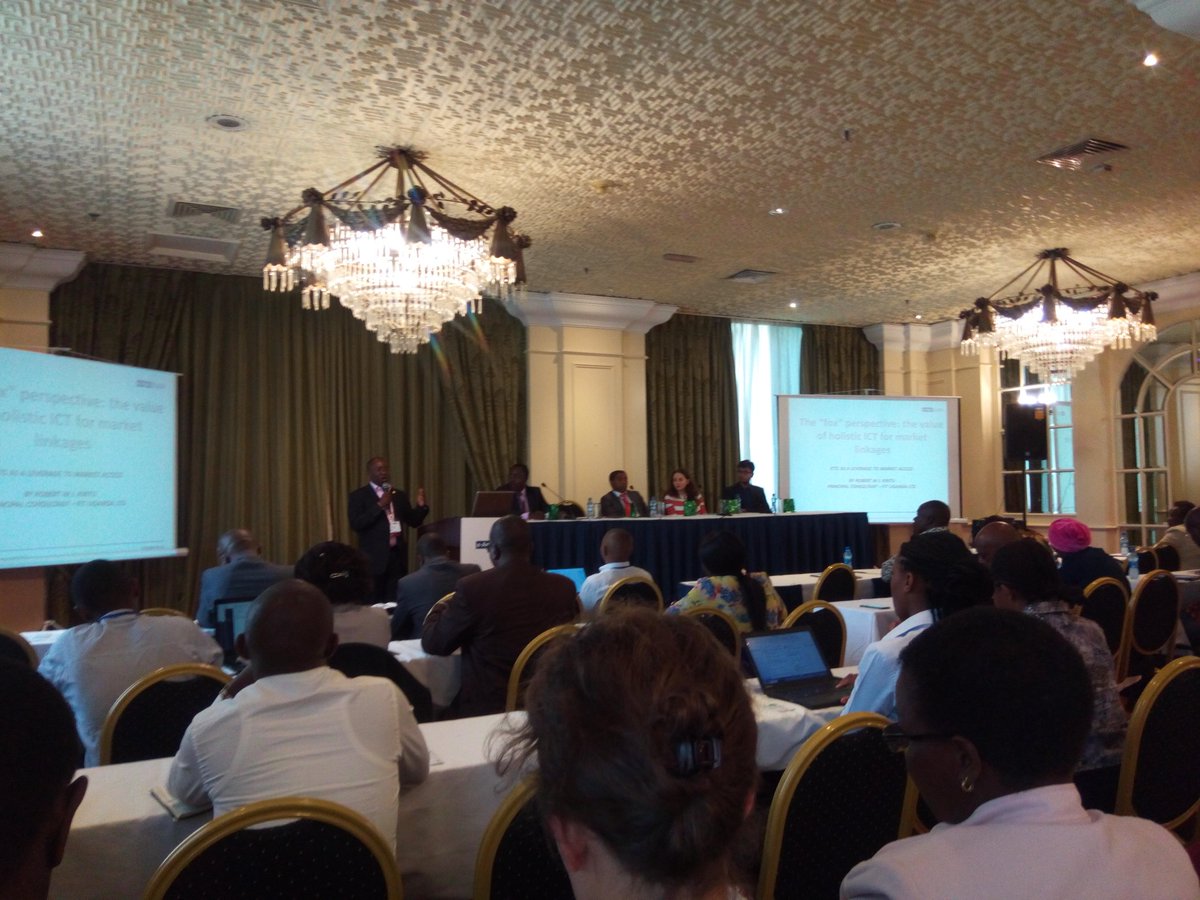28 February - 2 March 2017. Nairobi. A major obstacle facing the region’s agri sector is the use of innovative ways to utilise technology for improved production and increased productivity. E-agriculture offers a wide range of solutions to agricultural challenges and has great potential in promoting sustainability in the region.
It is against this background that the e-Agri East Africa Summit brought together proven innovative e-agriculture solutions for preventing post-harvest losses, improved production and increased productivity to improve the supply chain process from farmer to market and to enhance food security in the region.

Agri Logistics East Africa Summit highlights included an in-depth look at First Mile transport and development, transport hubs for agriculture transshipment, cold chain logistics and supply chain innovations and quality certification and customs management for exports.
The refrigerator, the first of its kind in Kenya, was built in late 2015 by the Rockefeller Foundation and TechnoServe, a nongovernmental organisation, under the YieldWise programme, an initiative aimed at cutting post-harvest losses among local mango farmers. The facility is fitted with four solar panels, an inverter and a car battery which enables it to store power to keep running during the night hours.
Makueni County is semi-arid and hot, especially during the mango harvesting season in January and February, but the cold storage room can reduce the ambient temperature from 35 degrees Celsius to as low as 17 degrees, which slows the ripening of the mangoes by several days. John Musomba, a farmer in charge of the refrigerated storehouse, said it can store up to 3.4 tonnes of mangoes.
It is against this background that the e-Agri East Africa Summit brought together proven innovative e-agriculture solutions for preventing post-harvest losses, improved production and increased productivity to improve the supply chain process from farmer to market and to enhance food security in the region.

Agri Logistics East Africa Summit highlights included an in-depth look at First Mile transport and development, transport hubs for agriculture transshipment, cold chain logistics and supply chain innovations and quality certification and customs management for exports.
Some speakers:
Panel Discussion: Creating an enabling environment for agricultural development in East Africa

Moderator: Lucy Muchoki, Chief Executive Officer, Kenya Agribusiness and Agroindustry Alliance (KAAA), Kenya
Panelists:
 Panel discussion: Analysing innovative Agri APPs fit for conditions in East Africa
Panel discussion: Analysing innovative Agri APPs fit for conditions in East Africa
The quality of the fruit is a big concern to farmers and traders hoping to sell to the lucrative export market. But now farmers in Nziu are benefitting from two innovations - solar-powered cold storage, and biological pest control - to help protect their harvest against the effects of climate change.- Edward Addo-Dankwa National Value Chain Development Officer Ministry of Food and Agriculture Ghana
- Mamadou Biteye Managing Director: Africa The Rockefeller Foundation Kenya
- Andrew Edewa Food Safety Officer African Union Tanzania
- Angel Mgawe LOGISA- Tanzania
- Joseph Juma Managing Director Kenya National Shipping Line Kenya
- Nozipho Mdawe Secretary General PMAESA Kenya
- Silvester Kasuku Director General & CEO LAPSSET Corridor Development Authority Kenya
Panel Discussion: Creating an enabling environment for agricultural development in East Africa
- Regulation and enforcement requirements for improved market access and trade
- Trade agreement opportunities and implications of Brexit and the recent US election for East Africa and ALGOA in particular
- Importance of new innovations in technology to ensure traceability and transparency in the supply chain
- The impact of public nutrition and food safety awareness campaigns on the supply chain
- Investment needs and opportunities in sea ports, inland depots and terminals, airports, roads and railway
- Using mobile to connect farmers with weather, agronomic and market pricing information – Malawi and Ghana case study Hannah Metcalfe, Country Manager Tanzania and Kenya, VOTO Mobile/Human Network International, Tanzania (picture)
- Eliminating post-harvest crop-losses with improved First Mile transport infrastructure David Ruchiu, Chief Executive Officer, Farm Concern International, Kenya
Moderator: Lucy Muchoki, Chief Executive Officer, Kenya Agribusiness and Agroindustry Alliance (KAAA), Kenya
Panelists:
- Peter Ngaruiya, Executive Director, Eastern and Southern African Dairy Association (ESADA), Kenya (picture)
- Jane Ngige, Chief Executive Officer, Kenya Flower Council, Kenya
- Okisegere Ojepat, Director, The Fresh Produce Exporters Association of Kenya (FPEAK), Kenya
- Jeroen van der Hulst, Director and Owner, Flowerwatch, Kenya (picture)
- The state of mobile technology applications in agriculture
- An overview innovative applications in Agri e.g. I-cow, M-Fram, Esoko, Vet Africa, EZ Frams, Modisar, Mobile Agribiz, Acre, VirtualBank Africa, Mobile Agribiz
- Mobile applications for access to financial services, factoring or invoice financing – how will this benefit the agriculture market
- Scaling up and sustainability of mobile agriculture initiatives
- Examples from successful pilots and financially sustainable models
Moderator: Mackenzie Masaki, Head of Agribusiness,
Netherlands-African Business Council (NABC), The
Netherlands (picture)
Panelists:
Makueni County is semi-arid and hot, especially during the mango harvesting season in January and February, but the cold storage room can reduce the ambient temperature from 35 degrees Celsius to as low as 17 degrees, which slows the ripening of the mangoes by several days. John Musomba, a farmer in charge of the refrigerated storehouse, said it can store up to 3.4 tonnes of mangoes.
Organic pest control. Countries like the United States ban horticultural produce from African countries where invasions of the B. dorsalis fruit fly have been reported, said Ivan Rwomushana, who leads the fruit fly integrated pest management programme at the International Centre of Insect Physiology and Entomology (ICIPE) in Nairobi. Rwomushana says ICIPE is training farmers in several biological methods to control fruit flies, including pheromone traps to capture and kill male fruit flies, and parasitic wasps. Sunday Ekesi, interim director of research and partnership at ICIPE, said the organisation is also developing a treatment that involves immersing mangoes in warm water for 45 minutes to kill any fruit flies on the fruit surface.
Related:

No comments:
Post a Comment